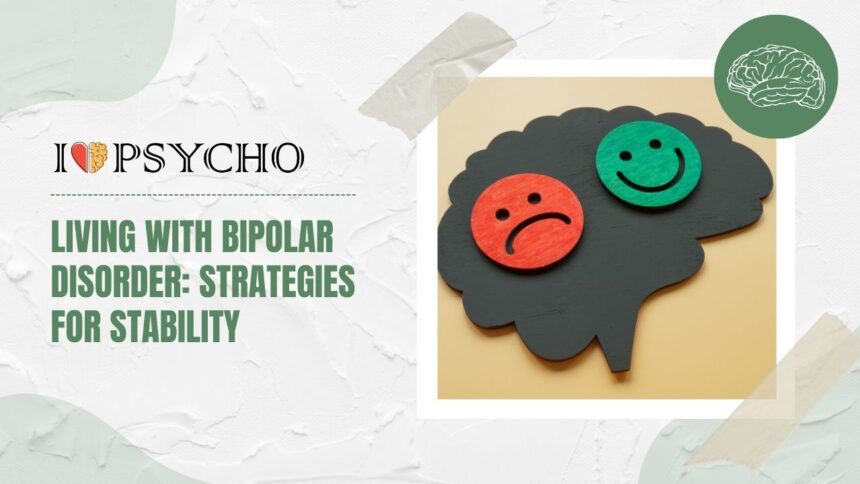Living with bipolar disorder can present unique challenges, but it doesn’t have to define your life. By understanding the condition, exploring treatment options, and implementing practical strategies, you can cultivate stability and find a sense of balance amidst the highs and lows. In this blog post, we’ll delve into different types of bipolar disorder, symptoms and triggers to watch out for, as well as lifestyle changes and coping mechanisms that can help you navigate this journey with resilience and hope. Let’s embark on this empowering exploration together!
Understanding Bipolar Disorder
Bipolar disorder is a mental health condition characterized by extreme mood swings. These shifts can range from manic episodes of heightened energy and euphoria to depressive episodes marked by sadness and low energy levels. Understanding bipolar disorder involves recognizing that it is more than just occasional mood swings; it’s a complex interplay of biological, genetic, and environmental factors.
Individuals with bipolar disorder may experience difficulties in regulating their emotions and behaviors. It’s essential to acknowledge that this condition can impact every aspect of a person’s life – from relationships to work performance. By increasing awareness about bipolar disorder, we can reduce stigma and foster greater empathy towards those navigating this challenging journey.
Educating yourself about the symptoms and manifestations of bipolar disorder can aid in early detection and effective management strategies. Seeking professional guidance is crucial for accurate diagnosis and tailored treatment plans that address your unique needs.
Different Types of Bipolar Disorder
Bipolar disorder is a complex mental health condition that manifests in different ways. There are several types of bipolar disorder, each with its own unique characteristics and symptoms.
One common type is Bipolar I Disorder, where individuals experience manic episodes lasting at least 7 days or severe enough to require hospitalization. Depressive episodes may also occur.
Bipolar II Disorder involves milder manic episodes known as hypomania, along with depressive episodes. These highs and lows can still significantly impact daily life.
Cyclothymic Disorder is characterized by numerous periods of hypomanic symptoms and depressive symptoms for at least 2 years (1 year in children).
Other specified and unspecified bipolar disorders encompass symptoms that do not fit neatly into the above categories but still significantly affect mood stability.
Understanding the differences between these types can help individuals receive proper diagnosis and treatment tailored to their specific needs.
Symptoms and Triggers
Living with bipolar disorder means navigating through a range of symptoms and triggers that can impact daily life. Symptoms can vary from extreme highs to lows, including manic episodes characterized by elevated mood, increased energy, and impulsive behavior. On the other end of the spectrum are depressive episodes marked by sadness, fatigue, and feelings of worthlessness.
Triggers for bipolar episodes can differ among individuals but commonly include stress, lack of sleep, substance abuse, or major life changes. Recognizing these triggers is crucial in managing the condition effectively. It’s essential to track moods and behaviors to identify patterns that may signal an impending episode.
Being aware of early warning signs can help in implementing coping strategies or seeking professional help before symptoms escalate. By understanding your unique symptoms and triggers, you empower yourself to take control of your mental health journey.
Treatment Options
When it comes to managing bipolar disorder, seeking the right treatment options is crucial. Medication is often prescribed to help stabilize mood swings and manage symptoms effectively. These may include mood stabilizers, antipsychotics, or antidepressants depending on the individual’s needs.
Therapy can also play a significant role in treatment. Cognitive-behavioral therapy (CBT) can help individuals identify and change negative thought patterns that contribute to their symptoms. Family therapy or support groups are beneficial for building a strong support system and improving communication within relationships.
In some cases, electroconvulsive therapy (ECT) may be recommended for severe episodes of mania or depression that do not respond to other treatments. It involves passing an electric current through the brain to trigger a controlled seizure, which can alleviate symptoms in some individuals.
It’s essential for those living with bipolar disorder to work closely with healthcare providers to tailor a treatment plan that meets their specific needs and promotes stability in their daily lives.
Creating a Support System
Living with bipolar disorder can be challenging, but having a strong support system in place can make all the difference. Surrounding yourself with understanding friends and family members who are willing to listen without judgment is crucial. Open communication about your needs and struggles can foster a sense of connection and trust within your support network.
Seeking out therapy or joining a support group for individuals living with bipolar disorder can also provide valuable insights and coping strategies. Connecting with others who share similar experiences can help you feel less alone in your journey towards stability.
In addition to personal relationships, it’s important to collaborate closely with healthcare professionals like therapists, psychiatrists, and counselors. These experts can offer specialized guidance tailored to your unique situation. Finding the right treatment plan that works for you may require trial and error, but having a supportive team by your side can make the process more manageable.
Remember, creating a robust support system takes time and effort, but investing in these relationships is an essential part of managing bipolar disorder effectively.
Lifestyle Changes for Managing Bipolar Disorder
Living with bipolar disorder can be challenging, but incorporating lifestyle changes can significantly impact your overall well-being. Establishing a consistent daily routine that includes regular sleep patterns and exercise can help stabilize mood swings.
Maintaining a healthy diet rich in fruits, vegetables, lean proteins, and whole grains can also support mental health. Avoiding alcohol and recreational drugs is crucial as they may exacerbate symptoms of bipolar disorder.
Finding coping mechanisms such as mindfulness meditation or journaling can provide outlets for managing stress and emotions effectively. Engaging in hobbies or activities that bring you joy and relaxation can contribute to a sense of fulfillment.
Building a strong support system of understanding friends, family members, or therapists is essential for navigating the ups and downs of bipolar disorder. Prioritizing self-care practices like setting boundaries, practicing self-compassion, and seeking professional help when needed are vital components of managing this condition efficiently.
Coping Strategies for Episodes
Living with bipolar disorder can be challenging, especially when experiencing episodes. One effective coping strategy is to establish a routine that includes regular sleep patterns and healthy meals.
Engaging in activities like exercise or hobbies can help distract from negative thoughts during manic or depressive phases. It’s crucial to communicate openly with your healthcare provider about any changes in mood or symptoms.
Developing mindfulness techniques such as deep breathing or meditation can aid in managing overwhelming emotions. Seeking support from friends, family, or a therapist can provide valuable insight and encouragement during difficult times.
Remembering to take prescribed medication consistently is essential for stabilizing moods and preventing severe episodes. Additionally, recognizing early warning signs of an impending episode can help intervene before it escalates.
By implementing these coping strategies into your daily life, you can better navigate the challenges of living with bipolar disorder and strive towards stability.
Finding Balance and Stability: Success Stories
Finding balance and stability while living with bipolar disorder is a journey that looks different for everyone. It’s about discovering what works best for you to manage your symptoms and lead a fulfilling life.
Success stories of individuals finding equilibrium often involve a combination of medication, therapy, and lifestyle changes. By understanding their triggers and early warning signs, they have been able to proactively address potential mood swings.
Developing healthy routines such as regular exercise, proper nutrition, and sufficient sleep can play a crucial role in maintaining stability. Engaging in activities that bring joy and relaxation can also contribute positively to overall well-being.
Building a strong support system with trusted friends, family members, or mental health professionals has been instrumental for many in navigating the challenges that come with bipolar disorder. Sharing experiences and seeking help when needed are key components of finding balance.
Achieving stability is an ongoing process that requires self-awareness, resilience, and dedication. By implementing effective strategies tailored to individual needs, it is possible to thrive despite the challenges posed by bipolar disorder.
Conclusion
Finding stability while living with bipolar disorder is a journey that requires patience, self-awareness, and resilience. By understanding the different types of bipolar disorder, recognizing symptoms and triggers, exploring treatment options, creating a strong support system, making lifestyle changes, and implementing coping strategies for episodes – individuals can find balance in their lives.
It’s essential to remember that managing bipolar disorder is not about perfection but about progress. Success stories of individuals who have found stability serve as a beacon of hope for those still navigating their path towards wellness. With dedication and determination, it is possible to lead a fulfilling life despite the challenges posed by this condition.
Remember: you are not alone in this journey. Reach out for help when needed, prioritize self-care, stay connected with your loved ones, and never underestimate the power of seeking professional guidance. Together we can break the stigma surrounding mental health issues and create a supportive environment where everyone feels empowered to thrive despite their circumstances.
Embrace your journey towards stability with an open heart and mind – every step forward counts towards building a brighter tomorrow.









